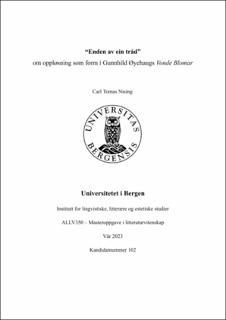"Enden av ein tråd" – om oppløsning som form i Gunnhild Øyehaugs Vonde blomar
Master thesis
Permanent lenke
https://hdl.handle.net/11250/3083936Utgivelsesdato
2023-05-16Metadata
Vis full innførselSamlinger
- Master theses [274]
Sammendrag
Denne masteroppgaven utforsker en måte å forholde seg til litterær og eksistensiell mening i lys av gjennomgående absurditet, gjennom dekonstruksjon av narrativ struktur, det narrative og det personlige subjektet og tanken om separasjon mellom en indre og ytre verden. Oppgaven tar utgangspunkt i Gunnhild Øyehaugs novellesamling Vonde blomar (2020), og drøfter denne i lys både av forfatterens øvrige skjønnlitterære forfatterskap og hennes egen hovedoppgave i allmenn litteraturvitenskap fra Universitet i Bergen, “‘Le coeur étrange du lointain’: om ironi som poesi: de Man, Rimbaud” (2002). Ved å gå i videre dialog med poengene hennes fra hovedoppgaven om ironi som en poetisk modus, og gå lenger i å dekonstruere det separate subjektet, sikter jeg mot å la denne oppgaven bli en respons på spørsmålene jeg mener Øyehaugs forfatterskap stiller. Det sentrale argumentet mitt går i retning av en grunnleggende poetisk omgang med verden som absurd tilsynekomst, gjennom dekreasjonen av avgrenset form og individualitet. This thesis explores an approach to meaning in the midst of absurdity, in and through the deconstruction of narrative form, the narrative subject, the personal subject and the world at large. I explore the subject by discussing the short stories found in Gunnhild Øyehaug’s short story collection Evil Flowers (2020), as contextualised by Øyehaugs oeuvre as a writer of fiction and essays, and using the theoretical discussions from her own graduate thesis as cand.philol. from the University of Bergen, “‘Le coeur étrange du lointain’: om ironi som poesi: de Man, Rimbaud” (2002), as a starting point. By expanding upon the themes discussed there – which revolve around irony as a poetic force, as discussed through both the deconstructive lens of Paul de Man, the absurdism of Albert Camus, the views of romantic thinkers such as Friedrich Schlegel, and the poetry of Arthur Rimbaud – I aim to initiate a dialogue with Øyehaug’s fictional work on her own theoretical terms, making this thesis a tentative response to questions posed in her writing. Øyehaug’s writing is highly textually and intertextually self-reflexive, and deeply vested in a humorous mixture of deconstructive and romantic thought. I argue that her fiction creates a self-dissolving weave where the boundaries between subject and object, text and reader, one text and another, and even language and world start to intermingle and dissolve. By focusing my efforts on highlighting how the short stories perform a metamodern deconstruction of both the notion of the literary and personal subject and the outer world made of solid things, I aim to show how the idea of humanity’s fundamental linguistic différance from the world dissolves into a kind of poetic, yet ironic suchness. To do this, I lean on the deconstructive thinking of J. Hillis Miller and Friedrich Nietzsche, Inger Christensen’s concept of the naïve reader of the world as poem, Michel Foucault’s writing on the baroque painting Las Meninas, Roland Barthes’ thinking on the plurality of text and self, Simone Weil’s thinking on decreation and metaxu, Jonathan Culler’s article on the performative virtuality of the poetic apostrophe, and Andrew Holecek’s writing on the buddhist concepts of form and emptiness. In the end I aim to resolve all these lines of thinking into a collective argument for the poetic interbeing of emptiness; letting Øyehaug’s stories take shape as phantasmal tools for decreating the text, the self, and the outer world into absurd non-separateness.
